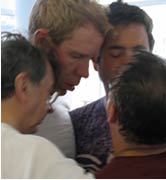 |
||||||||||||||||
|
|
||||||||||||||||
“Shame, fear of discovery and violence, alienation, social oppression: these are all obvious and well-documented. What is less visible is the impact of early disrupted peer bonding on body and relationship.” |
Soma Play with Gay Men:
Originally published in Yogi Times, March 2006 Contact and mutual recognition are two of our most basic needs. They are as important to an infant’s survival as food and water. Yielding into our mother’s embrace and being nurtured was our first lesson in safety. Looking into her eyes, seeing and being seen, was the first lesson in belongingness – a crucial feeling of connection and security. This bonding is somatic, it’s a feeling we experience in our body, and it stabilizes our physiology. Safety and belongingness, repeated over time, support us in our journey out into the world to find our peers, playmates and partners. Through somatic therapy, we move from the inside out to restore and expand our sense of safety and belongingness. We re-visit the foundational elements of our organism: breath, vocalization, touch and movement, allowing our body’s learned patterns to reorganize and create the conditions for healthy relationship. By befriending our bodies mindfully, we heal the tensions and inhibitions blocking our ability to breathe fully and express spontaneously. Gay men have unique themes that are shared and brought to this work. Shame, fear of discovery and violence, alienation, social oppression: these are all obvious and well-documented. What is less visible is the impact of early disrupted peer bonding on body and relationship. Many of us retreated from physical play with other boys as it didn’t match our temperament. We acutely felt our otherness. This lack of peer bonding and reflection impacts our experience of safety and belongingness in relationship. Even after we self-accept and come out later in life, yielding and allowing support in our most intimate relationships can be threatening as unconscious fears of humiliation, abandonment and shame linger in the background. For the past two years, I have led a weekly Somatic Expression group for gay men to explore their bodies in a safe, accepting and playful space. As one participant explains, “Most of the time I feel self-conscious about moving about and making sounds. This comes from years of being ostracized for being girly as a child. But each time I show up for the Somatic Expression group, I experience positive acceptance, engagement and affirmation from all of the men in the group and a new freedom and spontaneity in expressing myself through my body.” I think of infants as our models in this work. Infants need to feel inner support before they can securely risk reaching out into the world. Our self-explorations with breathing, crawling, cooing, speaking gibberish, etc. create this tangible inner somatic support for outer expression and contact. The need for connection propels us out of our own personal sphere into the public sphere, like leaving home to go to the playground. Going to the playground, though, can evoke painful and uncomfortable memories. Early imprinting lives on in our tissue and nervous system: how we related to our bodies and the bodies of other boys then is still present in us now. As adult men playing together, we have the opportunity to reclaim social play in the present moment and celebrate our physicality and sensuality. The experience of safety in the explorations creates a natural intimacy and a profound sense of connection. We gradually stop thinking, planning and worrying, and begin to experience the present moment more. And by bringing our self-reflective awareness to these experiences, we find individual and collective meaning. This is part of a larger healing: constructing a new narrative of how to be with one another as gay men. Somatic Expression uses body awareness, expression, relationship, play and reflection as essential ingredients in this construction. The wisdom of the body supports us in living our true nature and participating in an evolving vision of community. Copyright Jamie McHugh 2006. All rights reserved. |

NYC men's workshop |
||||||||||||||
| © Copyright Jamie McHugh. All rights reserved. About Jamie | What Is Somatic Expression? | Courses | Calendar | Somatic Expression Articles | Somatic Expression Links | Products | Contact Jamie McHugh | Home |
||||||||||||||||